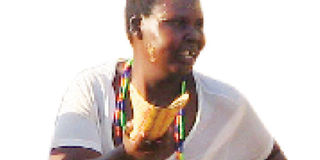Naming rituals among the Samia

A dancer performs the traditional Samia dance, Owaro. The dance is performed when people are happy. courtesy photo
What is in a name? That question can be answered differently depending on who is asked. Among the Samia, a community in eastern Uganda, a name means a lot. When I asked him the meaning of his name, Wanyama, a Samia friend of mine, had quite a tale. Apparently, upon his birth, he explained, the first meal his mother was served was millet bread and beef stew. The beef (enyama) stew, it turns out, formed the basis upon which he was subsequently named.
Although they are quite a small community, numbering 421,106 according to the National Population and Housing Census 2014, this does not take away the cultural diversity of the Samia people.
Their naming pattern, however, is one of the interesting aspects of this Bantu tribe.
According to Okumu Obanda, a 55-year-old resident of Busia District, the naming rites of the Samia are steeped in spirituality, time and events.
Growing up as a little boy in the community, he witnessed the naming process of all his siblings and several others. He explains that some of the names given were a portrayal of the prevailing circumstances and the emotional state the community was in at the time of a particular child’s birth.
“We have names like Wanjala, which was given to children born during food scarcity or famine. Masiga was given to a child born when the family was in grief after loss of a relative. ‘Amasika’ is Samia for tears,” Obanda says.
These particular names, he explains, acted as a reminder to the community, of those occurrences during which the child was born. Asked if indeed a child could be named basing on the food served after his birth, Obanda confirms that it is true.
“The name Mangeni, for instance, is one such name. When the bearer of that name was born, the first meal his mother was served was fish. ‘Engeni’ is Samia for fish,” he says.
The Basamia, it will appear, have a name for anyone depending on circumstances surrounding your birth. Even the time of day you were born can be the basis for your naming you.
The name Ajiambo (female) and Ojiambo (male) is given to those born in the afternoon (esijiambo) while the bearer of the name Bwire was born at night, and Ngolobe in the evening.
When you are born when it’s raining, you will be called Wafula (male) or Nafula (female). If one was born during harvest time, they would be called Nekesa (female) or Egesa (male).
Those born during the March/April heavy rainy season were called Natocho (female) while those born during the long dry season were named Siminyu!
Footsteps of elders
However, Betty Auma, a 58-year-old nurse from Namayingo District, says apart from names arising out of circumstances at birth, there are also names that are inherited from one’s ancestors and for these, a ritual was always performed.
This, she says was practiced by their ancestors and is not currently used in this era as most people are practicing Christianity which frowns upon such practices.
“When a child was born, the elder members of the family looked back at the deceased members of the family and identified two names,” she says. Two chickens – a cockerel in the case of a male child, and a hen for the girl – were also selected. Each was given either of the names identified and they would then be thrown on the roof of the family house. The one that stayed on the roof and didn’t fall would determine the name of the baby.
“It was taken that the ancestors would speak through this ritual and that name was given to the child,” she says.
The significance of this particular ritual, Auma reveals, was to ensure that ancestors were involved in naming new members of the community who would carry on their names and ensure they remained in the clan. In fact, it was said that often, these children grew up with the character of those they were named after!




